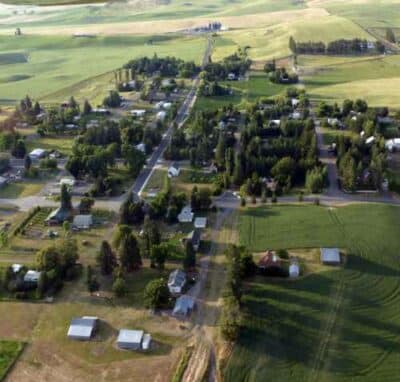One of the surprises on the first day of FTX in bankruptcy court is that FTX owned a teeny bank in a town of 146 people in the middle of nowhere. The Farmington bank was the 26th smallest in the United States. The bank’s name is Moonstone, an odd name for a bank in a farming village.
Before the FTX acquisition, Farmington’s deposits had been steady at about $10 million for a decade. But in the third quarter of this year, the bank’s deposits jumped nearly 600% to $84 million. According to FDIC data, nearly all that increase, $71 million, came from just four new accounts.

The Story
Farmington, in the rural farming region of Whitman County, Washington, was described as “no-frills” by the local newspaper The Spokesman-Review in 2010. Its then-president, John Widman, told the newspaper that it had stopped making mortgage loans because the paperwork was too much effort.
Moonstone changed the name shortly before FTX bought it. It’s single branch had three employees until this year and didn’t offer online banking or even credit cards. It instead specialized in agricultural loans to farmers.
The bank doesn’t mention crypto, just their desire to “support the evolution of next-generation finance.”
The report comes a day after FTX’s first day in court in which James Bromley, co-head of law firm Sullivan & Cromwell’s Global Finance and Restructuring practice, who is acting counsel to FTX’s newly installed leadership team, called the crypto exchange’s bankruptcy case “unprecedented” in his opening remarks.
“We have probably witnessed one of the most abrupt and difficult corporate collapses in the history of corporate America,” he said, as reported by Bloomberg.
It’s hard to believe the purchase of this bank was legitimate.
Perhaps it was a foot in the door for a bigger bank. Maybe buying a teeny bank doesn’t require the same approvals, or maybe Samuel Bankman-Fried’s political connections helped.
Moonstone sounds like the perfect bank for money laundering, but who are we to say?
Red Flags
Whatever the case, it sounds illegal.
“The fact that an offshore hedge fund that was a crypto firm was buying a stake in a tiny bank for multiples of its stated book value should have raised massive red flags for the FDIC [Federal Deposit Insurance Corporation], state regulators, and the Federal Reserve,” Calvert Advisors President and CEO Camden Fine, a bank industry consultant, said in the report. “It’s just astonishing that all of this got approved.”
According to the report, federal regulators would have needed to approve FTX buying a stake in a U.S.-licensed bank, and experts said it’s unlikely they would have knowingly done so.
Odder Still
In 2020, a company named FBH purchased Farmington State Bank. FBH’s chairman is Jean Chalopin. He is also chair of Deltec Bank and Trust — one of the main banks for Alameda Research and Tether.
Chalopin joined Farmington’s board of directors.
They planned to deal with cryptocurrency and international payments, so they applied for Federal Reserve approval, and remarkably, they were approved.
FTX invested $11.5 million, nearly double its worth.
The FTX story just gets wilder.
Earlier this year, SBF invested $11.5m in Farmington State Bank in Washington St. (nearly double the bank’s value).
It’s the 26th smallest bank in the US. It serves a town of 146 people. Has only 3 employees. And looks like my parent’s garage. pic.twitter.com/G1HiUwcTQy
— Trung Phan (@TrungTPhan) November 25, 2022
Alameda bought a US bank (Farmington State) connected with Deltec and Tether, and then transferred it to FTX.
There’s no way that the regulatory approval of a Bahamian HF buying a US bank was legit. No way.
FTX was a criminal enterprise from the start.https://t.co/KOslRXLMko
— Ben Hunt (@EpsilonTheory) November 24, 2022
Subscribe to the Daily Newsletter